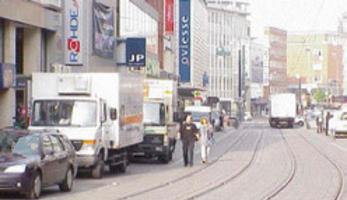Introducing compressed natural gas trucks
Thematic areas
Urban logistics
Summary
The key objectives of the City Logistics project in Bremen was to reduce emissions and improve the overall efficiency of goods delivery in Bremen.
Implementing sustainable mobility
The measure focused on the development of efficient urban freight distribution through consolidation systems and logistics software. The overall aim was to reduce emissions and energy consumption by making the distribution of goods to difficult areas, such as the city centre, more competitive than conventional logistics options. The demonstration project was also designed to raise awareness and increase acceptance of low-emissions vehicles in freight transport among carriers and shopkeepers.
Within the VIVALDI project, the objectives were to introduce economic and environmentally friendly trucks running on compressed natural gas (CNG); extend bundled transportation into the city centre; and to develop and apply telematics solutions for the optimisation of logistic flows.
Progress
Despite great efforts, it was not possible within the project period to purchase any CNG trucks in the planned weight class, as there were none offered by the motor industry. However, City Logistics purchased a bio-diesel truck, partly to assess the economic and ecological impacts and partly to test the new online telematics systems.
Outcomes
Within the project period, units for customers were consolidated each day at the Bremen Freight Village (GVZ) and transported to target areas (shopping centre, central warehouse). A monthly reduction in truck mileage of about 9,000 km was achieved by City Logistics. This correlates to 70 day-tours by trucks in the 7.5-ton category. A total of 1,100 litres of diesel fuel were saved each month by
the grouping, representing a significant reduction in emissions. Ongoing difficult market conditions in relation to the forwarding services, and problems with the planned use of environment-friendly vehicles for city distribution were obstacles to the success of City Logistics in Bremen. The increased efficiency of “conventional” logistics operators and customers’ demands for specific delivery times made it harder for the City Logistics operator to be successful under real market conditions without additional subsidies from the public sector.







